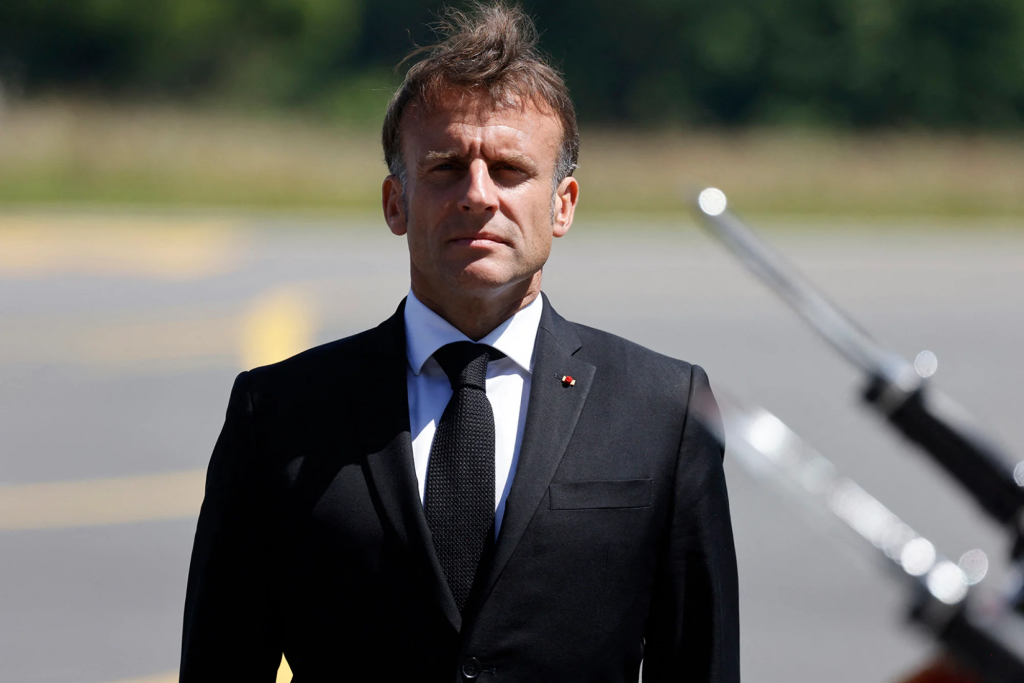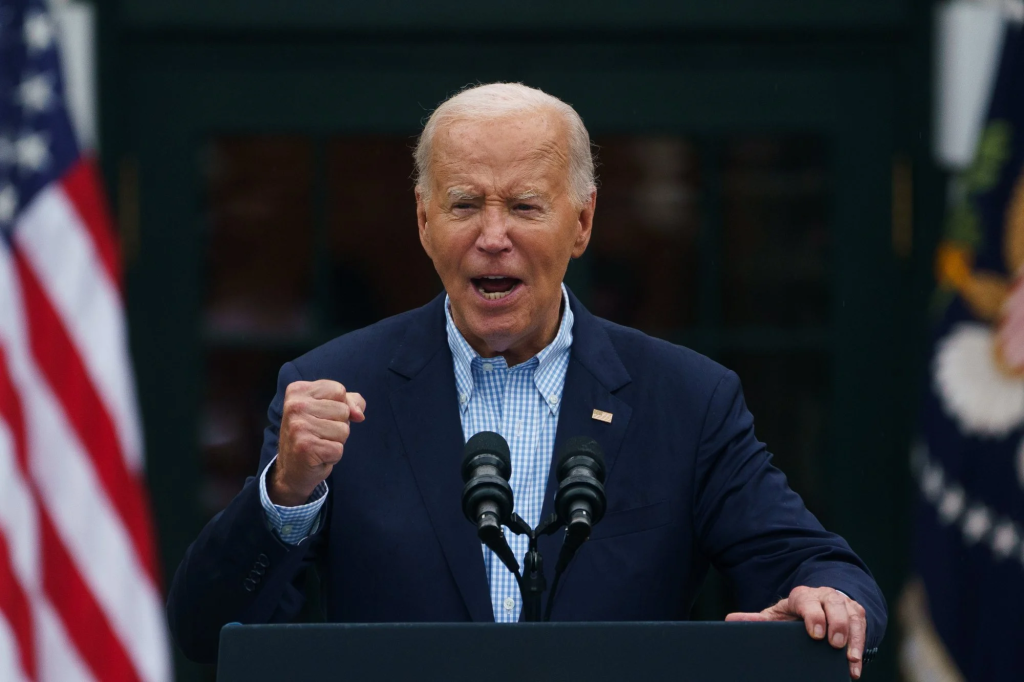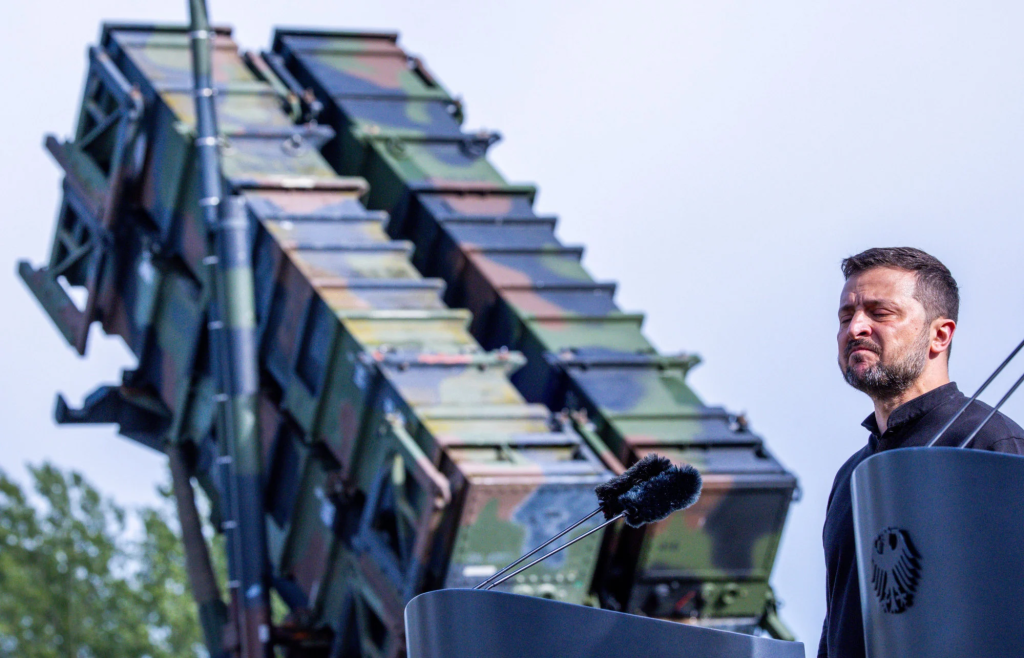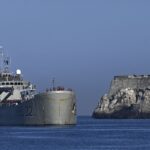
When leaders of the North Atlantic Treaty Organization gather in Washington next week to celebrate the enduring unity between Europe and North America, Vladimir Putin, Xi Jinping and Donald Trump will be the names dominating the discussions.
A senior official in US President Joe Biden’s administration said on Friday that negotiations on the summit’s final communique were continuing but the draft text on China was “very solid”. Reiterating evidence of Beijing’s role in rebuilding Moscow’s defence industry, he added that China was not only “fuelling” the war in Ukraine but also “creating a long-term challenge to European security, which of course our allies recognise”.
“And so we will have, I think, strong language on that,” he said, confirming that the issue will be addressed by NATO with its other partners in Europe and the Indo-Pacific.
The three-day meeting, which begins Tuesday, will come as the United States and Europe seek new friends, face competition from new adversaries and prepare for significant domestic political transitions with potentially lasting implications for the world’s oldest surviving defense pact.
In an opinion piece published in Foreign Affairs on Wednesday, NATO Secretary General Jens Stoltenberg said Putin had become “increasingly aligned with other authoritarian powers, including China, who want to see the United States fail, Europe fragment and NATO falter.”
Last month, he said: “Presidents Putin and Xi are firmly against NATO because they know that in NATO the United States has something they do not have – 31 friends and allies.”
And in what sounded like a response to Trump’s comments about encouraging the Russians to do “whatever the hell they want” with any NATO member country, Stoltenberg reminded Washington that the 75-year-old alliance has helped “advance U.S. interests, multiply U.S. power and keep Americans safe.”
NATO was born on April 4, 1949, from the ashes of World War II. The goal of its 12 founding countries, including the United States, was to ensure their “collective defense” in an “unpredictable” world, according to NATO’s website.
The bloc – which expanded to 32 nations with the addition of Sweden and Finland following Russia’s 2022 invasion of Ukraine – now faces “an even more dangerous world”, Stoltenberg said.
Member countries voluntarily contribute troops and funding to the alliance, with each nation determining its own defense spending. The alliance does not have its own military; instead, its military protections are guaranteed by its member countries.
In 2014, NATO leaders pledged to allocate at least 2 percent of their countries’ gross domestic product to defense spending.
Only 11 countries will reach that threshold by 2023. According to Stoltenberg, more than 20 members have already reached or are close to reaching the alliance’s spending target this year.
Analysts said they expected more rhetoric than action at the summit, pointing to concerns including the health of U.S. President Joe Biden after a poor debate performance against NATO detractor and election rival Trump; French President Emmanuel Macron’s electoral setbacks against the far right; Hungarian President Viktor Orban’s recent talks with Putin; disagreements over further aid for Ukraine and its path to membership; war fatigue among the European public; and a challenging economic environment on the continent.
Lyle Goldstein, director of the Asia Engagement Program at Defense Priorities, a Washington think tank, said he was “not really expecting much new” given the “very difficult situation” for NATO countries facing “a variety of interconnected crises.”
“All the complications of domestic politics, whether it’s in Britain, France, the United States or the Netherlands; Viktor Orban showing up in Kiev, making a peace overture,” Goldstein said.
In May, France and Germany allowed Ukraine to use its weapons against targets inside Russia. Macron has also hinted at the possibility of French troops in Ukraine. Under his leadership, Paris has been one of Kiev’s most vocal supporters.
But France’s far right, leading in parliamentary elections, has vowed to cut aid to Ukraine. Until earlier this year, France’s National Party had called for deepening diplomatic ties with Russia.
Ahead of the summit, NATO allies failed to commit to a precise amount of aid for Ukraine in the coming years. Cutting Stoltenberg’s idea of a multi-year financing proposal of $100 billion, the bloc will announce a $43 billion package for Kiev by 2025.

There is still no consensus on when and how to include Ukraine as a NATO member. A senior Biden administration official said Friday that while the allies were still debating the language in the final declaration, they were announcing “a bridge” to make Ukraine’s eventual membership “irreversible.”
However, in an open letter on Wednesday, 60 foreign policy experts warned against Ukraine moving forward with its membership. “If Ukraine joined NATO, Russia would have reason to doubt the credibility of NATO’s security guarantee – and would gain an opportunity to test and potentially break up the alliance,” they said, adding that the “outcome could be a direct NATO-Russia war or the collapse of NATO itself.”
Defence Priorities’ Goldstein noted that most of the countries that met the 2% threshold were geographically close to Russia – such as Estonia, Latvia and Lithuania – or were “usual suspects” like Poland, but that many others were “very reluctant”. In 2023, the biggest defence spender in NATO was Poland, followed by the US, with stronger powers such as Germany, France and Italy trailing well behind.
Biden has been a staunch supporter of the alliance, but as he prepares to host the summit, his political future hangs in the balance. There have been strong calls, including from within his own party, for him to withdraw from the presidential race after his dismal debate performance.

A recent New York Times/Siena College poll showed that Biden, who is more than six years older than NATO, trails by six percentage points — 49% to 43% — Trump, who as president accused allies of not “paying their bills” and threatened to withdraw from the bloc.
According to US media reports, Trump’s aides have discussed a reshaping of NATO that would diminish the US’s role as the main guarantor of European security. Another proposal involves a possible deal on Ukraine, where NATO would commit to refraining from further eastward expansion while allowing Moscow to maintain its current territorial acquisitions. Trump has repeatedly suggested that he would cut off US military aid to Ukraine and has said that he could end the war in three days if re-elected.
Goldstein called the situation “extremely destabilizing” for NATO, saying “the timing could not be worse for NATO and for the Biden administration.” “Even if Biden were in perfect health, the alliance would still be in a bad place. But in this circumstance, it’s almost the worst-case scenario … where the alliance is literally rudderless, and all eyes are on Trump and what he might do,” he said.
The senior Biden administration official said he was not concerned by Trump’s words, but added: “We will continue to press for equitable burden-sharing and credible plans from all allies.” At a time when Europe may be facing cuts in US defense support, Washington has identified Beijing as its top threat, but for Brussels Russia remains the biggest security challenge.
Camille Grand of the European Council on Foreign Relations, a think tank in Berlin, said that regardless of who won the US presidential election, it was time for Europeans to “accept more responsibility for the defence of Europe” and approach it “much more strategically”.

He stressed the need for a comprehensive strategy spanning the next decade, focusing on immediate actions to strengthen Ukraine and increase European combat readiness and capabilities, which traditionally rely heavily on US support.
An analysis of the summit by the Center for Strategic and International Studies, a Washington think tank, noted that NATO allies were increasingly recognizing the importance of the Asia-Pacific to their own security. “Forty percent of Europe’s trade passes through an increasingly contested South China Sea, while Russia’s war in Ukraine has been sustained by imports of North Korean munitions and Chinese dual-use goods,” it said.
The alliance’s four Indo-Pacific partners — Australia, Japan, New Zealand and South Korea — have become regular fixtures at NATO’s high-level summits since 2022. Tokyo, along with the US and other NATO countries, has signed a bilateral security agreement with Ukraine. South Korea is considering the same. “Increasing military cooperation between Russia and North Korea and Russia’s attempt to coerce South Korea into ceasing support for Ukraine could also bring Seoul closer to Brussels,” the report said.
China and Russia have warned against NATO’s eastward expansion. The Biden administration official clarified on Friday that NATO remains focused on the Euro-Atlantic area, and “that’s where its capabilities are being deployed. And so not in the Indo-Pacific.” He added that discussions with Indo-Pacific partners would be on issues related to cyber, disinformation and technology in terms of deterrence and defense.
Via South China Morning Post
Source: https://www.ocafezinho.com/2024/07/05/vladimir-putin-e-xi-jinping-serao-foco-da-proxima-cupula-da-otan/

